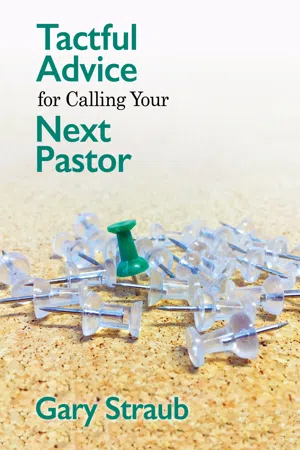![]()
Encouragement
Most of God’s good work gets done by folks who have already done a good day’s work by the time they get to church. Serving on the search team is well above and way beyond the call of duty. Your efforts will write a new chapter in your church’s life and mission. Your decisions will create a new ministerial partnership to guide and bless your church for years.
No pressure, right? You should be feeling it right about now. This may well be the single most important decision the congregation makes for some time to come. The reason it feels heavy is that there is a sobering weightiness to this task. It requires attentiveness to due process and a renewed communal commitment to prayer. Now is a great time to form a prayer team devoted to supporting this effort.
A certain humility is required for search team work, a certain willingness to suspend judgment and hold a certain groundedness—to be “of the earth” and rooted in place and in faithful trust. Here are some other spiritual qualities to be lauded:
1. Willingness to “not know” and be open to learn.
2. Good faith cooperation with the process requirements in a prayerful mindset.
3. Spiritual stability that keeps faith and steady resilience even when nothing seems to be working out.
4. Patience to listen not just until it’s your turn to speak, but at the deeper levels of heart and soul; listening deeply, all the way down to the heart of the core issues.
5. Devotion that trusts the Holy Spirit to do that which only the Spirit can do.
6. Prayerful imagination that holds in the heart of God the paradox of congregational life. (By this I mean owning up before God to all that you are as a congregation—and all that you are not! Let’s face it: humans are a tangled web of inconsistency and contradiction, yet beloved.)
7. Attending to the task and to each other with a spirit of joy, zest, and adventure.
One search team chair was driving home after an initial “ground rules” meeting that got rather intense, and this prayer came to mind:
“Lord, as I drive home tonight, somewhere there is a pastor who is heading home from a long day and an even longer evening meeting and thinking: ‘Maybe what I can do here is done. It’s been a good run, a fruitful season; maybe I should consider a fresh call.’ Lord, might we be the answer to this prayer? Could we be the very challenge needed next? May your mysterious mercy make it so. Amen.”
![]()
Confidentiality Covenant
Effective search teams begin building trust and community from the very moment they are asked to serve. Trust is the bond of mutual fidelity we create by what we choose to do with what is said within our confidential conversations. Trust doesn’t just happen. It must be cultivated and only arises out of confidentiality. The World War II motto still applies: “Loose lips sink ships.” Leaky search teams lose the congregation’s trust—especially so when everyone in the pew seems to already have insider information on the top candidates and current search status before the team even reports. Agreement around what confidentiality means often reveals awkward places where our church family enmeshment needs a bit of untangling.
Search teams require candid, explicit conversation with full verbal agreement around the definitions of clarity and accountability. Nothing leaves the room. Ever. It all lives here and remains when we walk out. No heavy hints at home. No carrying papers out that might innocently be left somewhere. (Keep all papers, including your notes, in a locked cabinet in the church.) Please agree that at the first sign of discord, there will be no dragging out confidential information as ammunition for a kitchen sink church fight. “Never disclosed” means never.
Silly as it may seem for grown adults to go slowly around the room and explicitly invite each and every team member to offer an audible, verbal assent to the consensus definition of “confidential,” this is what is necessary to create a confidentiality covenant. Think of it this way. When you elect to sit in the emergency exit row on an airplane, the flight attendant requires an out-loud, verbal consent that you understand and agree to the requirements and responsibilities of sitting in that row. A head nod will not suffice. Airlines do not yet need written and notarized statements or require blood oath covenants…but…well… Get the drift?
How will you create a safe holding space for sacred conversation? Spell out the details of your confidentiality covenant, then go around the room asking each other: “Is there any part of ‘nothing leaves the room’ that is unclear to you?” Spell it all out in your context. I know it is sounds sophomoric, but I urge you to engage in the full conversation. This means no pillow talk or even pillow hints. Not to your spouse, soul mate, or best friend. No jesting or jousting that reveals anything more than what the search team has publicly said. And, after the search team is successful and a call is extended, no tattling out of school or after school. One last point: There is no time limit or expiration date on this trust clause. It strains Christian unity and charity when search team deliberations show up in a heated board meeting six months after the call. While you are binding each other in sacred trust, make sure you agree on how long this confidentiality bond holds.
I know it is tedious to be this explicit, but the next step is to hold each other accountable. Blow the whistle and call strict fouls on this matter or your search team may foul out before it can even put any points on the board. Consider forging this relational agreement as team homework. Some search teams actually hammer out a signed covenant of confidentiality. I know of search teams who did not come to firm agreement around their own definition of confidentiality and were a leaky sieve as a result. After several warnings, the board chair finally had to dismiss and reconstitute the entire team. It was an embarrassment that humbled and haunted them, yet it revealed gossip dynamics that explained a history of gaffes that had long plagued the congregation’s communication. What does your team need to create a group atmosphere in which this mutual understanding is not only official policy but an honored and covenanted agreement? Furthermore, does the congregation understand and agree to not pester or pry information? Sometimes in reaction to the accusation that the team is too secretive or too slow it may be tempting to appease expectations for prompt results by leaking little tidbits and hints. This is a huge no-no. Simply smile and quote the standard wisdom: “These days a ‘normal’ search process often takes 12–18 months.”
Before your team even gets off the ground, some folks will already be asking, “Are you done yet? If not, why not?” Take a proactive approach and communicate process, progress, and numbers, but no names, places, or any identifiable hints. One team posted their progress in writing and worship announcements until they were nearly sick of hearing themselves communicate. Only then had they barely begun to have the congregation’s attention. Remember the congregation is about five repetitions of communication behind your present progress, so allow extra lead time for those who are “slow to hear but ever swift to speak” to catch up.
One search team made valiant efforts to over-communicate, only to discover the anxiety level of the congregation was such that whatever information the team offered was not enough, and only prompted more angst. Imagine anxious inquiry as opportunity to reinforce core values, common dreams, and the kinds of things you hope the congregation knows about itself. When people ask, this is also a good time to elicit intercessory prayers.
If all this sounds stark raving rabid and way over the edge, you are getting the point. Spare your team future agony and spell confidentiality out on the front end. If you have a leak, address it now or it may bite you at a most inopportune moment. I press this point out of sad experiences where excellent candidates, who may well have been a great congregational match, got spooked and withd...


